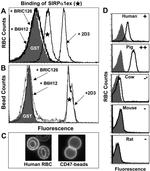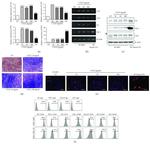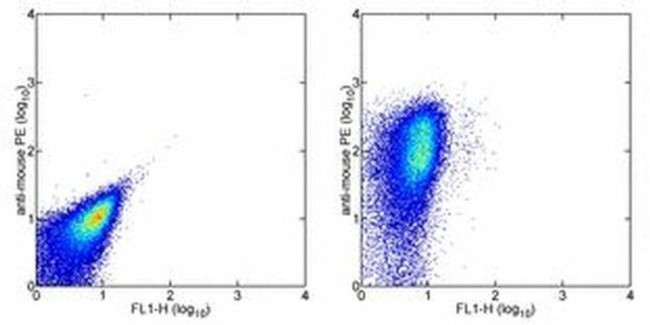Search Thermo Fisher Scientific
Invitrogen
CD47 Monoclonal Antibody (2D3), eBioscience™
FIGURE: 1 / 3
CD47 Antibody (14-0478-82) in Flow



Product Details
14-0478-82
Species Reactivity
Published species
Host/Isotype
Class
Type
Clone
Conjugate
Form
Concentration
Purification
Storage buffer
Contains
Storage conditions
Shipping conditions
RRID
Product Specific Information
Description: The monoclonal antibody 2D3 reacts to CD47 also known as integrin-associated protein (IAP), and neurophilin. CD47 is a glycosylated five transmembrane protein with a small alternatively spliced cytoplasmic domain. CD47 is involved in adhesion through interactions with SIRP (signal regulator protein) and is non-covalently associated with beta3 integrins CD51/CD61 and CD41/CD61. Furthermore this interaction can mediate bi-directional signaling to modify neural synaptic activity and regulate the phagocytic activities of macrophages. CD47 is the receptor for thrombospondin. T cell expression of CD47 can mediate activation or apoptosis (in the presence of high levels of thrombospondin). Expression is found in the majority of hematopoietic cells including T and B cells, monocytes, platelets and erythrocytes (as part of the Rh complex). Expression is also found in non-hematopoietic cells.
Applications Reported: This 2D3 antibody has been reported for use in flow cytometric analysis, and immunoblotting (WB) under nonreducing conditions.
Applications Tested: This 2D3 antibody has been tested by flow cytometric analysis of normal human peripheral blood cells. This can be used at less than or equal to 0.5 µg per test. A test is defined as the amount (µg) of antibody that will stain a cell sample in a final volume of 100 µL. Cell number should be determined empirically but can range from 10^5 to 10^8 cells/test. It is recommended that the antibody be carefully titrated for optimal performance in the assay of interest.
Purity: Greater than 90%, as determined by SDS-PAGE.
Aggregation: Less than 10%, as determined by HPLC.
Filtration: 0.2 µm post-manufacturing filtered.
Target Information
CD47 (integrin-associated protein, IAP) is a ubiquitously expressed cell surface transmembrane glycoprotein interacting with several integrins and regulating their functions. Engagement of CD47 by soluble ligands or counter receptors modulates various signaling pathways, such as activation of heterotrimeric G proteins. Functionally, CD47 is involved in the increase in intracellular calcium concentration that occurs upon cell adhesion to extracellular matrix. CD47 is also a receptor for the C-terminal cell binding domain of thrombospondin, and it may play a role in membrane transport and signal transduction. CD47 has broad tissue distribution, is reduced in expression on Rh erythrocytes. CD47 acts as a ligand for CD172a (signal regulatory protein alpha, SIRP alpha), an immune inhibitory receptor on macrophages; this interaction prevents phagocytosis of CD47-positive cells. Moreover, CD47-CD172a system affects cell migration, B cell adhesion, T cell activation, and is involved in modulation of chondrocyte responses to mechanical signals, and promotes neuronal development, being especially abundant in synapse-rich regions of brain and retina.
For Research Use Only. Not for use in diagnostic procedures. Not for resale without express authorization.
Bioinformatics
Protein Aliases: antigen identified by monoclonal antibody 1D8; Antigenic surface determinant protein OA3; CD47; CD47 antigen; CD47 antigen (Rh-related antigen, integrin-associated signal transducer); CD47 glycoprotein; IAP; integrin associated protein; Integrin-associated protein; integrin-associated signal transducer; Leukocyte surface antigen CD47; Protein MER6; Rh-related antigen; sCD47; soluble CD 47; soluble CD47
Gene Aliases: CD47; IAP; MER6; OA3
UniProt ID: (Human) Q08722
Entrez Gene ID: (Human) 961

Performance Guarantee
If an Invitrogen™ antibody doesn't perform as described on our website or datasheet,we'll replace the product at no cost to you, or provide you with a credit for a future purchase.*
Learn more
We're here to help
Get expert recommendations for common problems or connect directly with an on staff expert for technical assistance related to applications, equipment and general product use.
Contact tech support
